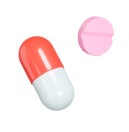Uses
What is Insulin Detemir for?
Detemir is a long-acting insulin. It is used to reduce high blood sugar levels in patients with diabetes mellitus.
You can also find out about this medication by watching these videos:
They are available in English, 中文, Melayu and தமிழ்: Insulin Detemir
How should I take or use Insulin Detemir?
Insulin Detemir is given once or twice a day with or without food as an injection into the fatty tissue that is between the skin and muscle layer. Use the injection technique advised by your doctor or nurse and as described in the manual.
Ensure that your insulin appears clear and colourless before use. Do not use it if it appears cloudy, grainy or if particles are seen.
How to select an injection site
Insulin should be injected into the fatty tissue that is between the skin and muscle layer. You should rotate the injection site within the same area to prevent your body from forming lipodystrophy (a small lump or dent in the skin that forms when a person repeatedly injects in the same spot).
Do not inject insulin in the areas that are actively used during exercise.
Your abdomen or stomach area is the best site for injection as it provides the fastest and most consistent absorption of insulin.
How to inject insulin
- Clean the skin before injecting the insulin.
- Lift a skin fold.
- Insert the needle at 90 degrees, at a right angle to the skin.
- During the injection, inject the insulin by pushing the plunger all the way down slowly with your index finger, wait for about 10 seconds before removing the needle and releasing the pinched skin.
- While removing the needle from your skin, make sure you keep the plunger pushed down. This will ensure you get the full dose. Do not rub or massage the injection site.
- Throw the pen needle away properly in a container that cannot be punctured.
You may refer to this article for more details on insulin injection techniques.
What should I do if I forget to take or use Insulin Detemir?
If you missed a dose, discuss with your doctor on what to do next.
If you forget to inject your insulin, your blood sugar may get too high, a condition known as hyperglycemia. Check your blood sugar with a home blood sugar meter (glucometer).
If your blood sugar remains high for too long, you might develop diabetic ketoacidosis. This is a complication of diabetes that is caused by an increase in the amount of ketones in your blood or urine, which causes your blood to become more acidic. Symptoms of diabetic ketoacidosis include:
- Increased urination
- Feeling thirsty
- Feeling sick, nauseous or vomiting
- Feeling drowsy or tired
- Having abdominal pain
- Having a flushed face
- Sweet fruity smell in your breath
You should see the doctor immediately if you have the above symptoms.
Precaution
What precautions should I take when taking or using Insulin Detemir?
Inform your healthcare professional if you:
- Are allergic to this medication or any of the other ingredients of this medication
- Drink alcohol often
- Are eating less than usual due to sickness/a changed diet as your dosage may need to be changed
- Are travelling across different time zones. You might need to adjust the number of meals and the dose of your insulin based on where you travel to.
- Are pregnant or breastfeeding
Discuss with your doctor if you should omit this insulin injection until after your blood test is taken.
What food or medication should I avoid when I take or use Insulin Detemir?
Avoid taking alcohol with this medication as this may increase your risk of having low blood sugar.
Side Effects
What are some common side effects of Insulin Detemir?
Like all medications, this medication may cause some possible side effects but not everyone experiences them. Consult your healthcare professional if any of the side effects becomes severe and bothersome.
This medication may cause low blood sugar (hypoglycemia). Symptoms of low blood sugar include:
- Weakness
- Dizziness
- Hunger
- Sweating
- Trembling
- Blurred vision
- Walking unsteadily
- Fast heartbeat
If you experience any of these low blood sugar symptoms, do the following immediately:
Step 1: Check your blood sugar level with a home blood sugar meter (glucometer) if available. If your blood sugar level is less than 4 mmol/L, take 15 grams of fast-acting sugar. Examples of 15 grams of fast-acting sugar include:
- 3 glucose tablets or
- Half a glass of fruit juice (200ml) or
- Half a can of soft drink or sweetened drink (175ml) or
- 1 can of less sugar soft drink (330ml) or
- 3 teaspoons of sugar, honey or syrup
Step 2: Monitor yourself for 15 minutes. If you have a glucometer (home blood sugar meter), check your blood sugar level again after 15 minutes.
Step 3: If your blood sugar level is still less than 4 mmol/L or you still have symptoms of low blood sugar, you should take another 15 grams of fast-acting sugar as per Step 1.
If your symptoms do not go away, see a doctor or go to the hospital immediately.
Step 4: Take your meal or snack if your blood sugar level is 4 mmol/L and above after consuming the fast-acting sugar earlier on.
Low blood sugar may occur if you:
- Inject too much insulin
- Do not eat on time, miss your meals or change your diet
- Exercise or work too hard just before or after a meal
- Do not eat well due to an infection or illness (especially diarrhoea or vomiting)
- Drink alcohol on an empty stomach while injecting insulin
- Have kidney or liver problems which have worsened
Some patients may also experience mild pain, redness, bruising, swelling, a small lump or dent of the skin at the injection site.
- Do not reuse your needles, rotate injection sites within the recommended areas and use shorter needles (4mm or 6mm) to reduce the chances of developing such reactions.
- They also usually go away in a few days to a few weeks.
- See a doctor if you frequently experience this. Your injection technique may need to be reviewed.
What are some rare but serious side effects that I need to seek medical advice immediately?
The symptoms of a drug allergy include one or more of the following:
• Swollen face/eyes/lips/tongue
• Difficulty in breathing
• Itchy skin rashes over your whole body
If you experience any of these symptoms, you should stop your medication and see your healthcare professional immediately.
You can also find out about drug allergies by watching these videos:
They are available in English, 中文, Melayu and தமிழ்: Drug Allergies
See a doctor or go to the hospital immediately if your blood sugar level is always low (less than 4 mmol/L) or you continue to experience symptoms of low blood sugar even after taking some sugar (see instructions above for management of low blood sugar).
Handling
How should I store Insulin Detemir?
Store all unopened insulin in a refrigerator between 2 to 8 degrees Celsius. Do not freeze.
Do not keep insulin in a hot place (eg. in a hot, closed vehicle, on top of a television set) or expose it to heat or sunlight. Do not use the insulin if this happens.
Once the insulin has been first used, do not refrigerate, but keep it in a cool dry place. Discard the insulin 6 weeks after opening.
Keep this medication out of reach of children. Throw away all expired medication.
How do I throw away Insulin Detemir safely?
You may throw this injection away along with the used needles into a metal tin or thick plastic container (eg. detergent bottles). You can also buy a container specially designed to throw sharp items, known as a sharps box, to prevent any injuries due to the needles.
For more information
What else should I know about Insulin Detemir?
Please refer to the product insert which can be found in the medication box, for instructions for use of your specific insulin preparation.
Disclaimers
Please take note that the above is not a complete list of all possible side effects. If you have any concerns about your medication or if you have other side effects that you think are caused by this medication, please consult your doctor or pharmacist.
If you take more than the recommended dose, please seek medical advice immediately. The information provided on this page does not replace information from your healthcare professional. Please consult your healthcare professional for more information.
This article is jointly developed by members of the National Medication Information workgroup, and supported by the Ministry of Health. The workgroup consists of cluster partners (National Healthcare Group, National University Health System and SingHealth), community pharmacies (Guardian, Unity and Watsons) and Pharmaceutical Society of Singapore. The content does not reflect drug availability and supply information in pharmacies and healthcare institutions. You are advised to check with the respective institutions for such information.
Please visit www.moh.gov.sg/knowyourmeds and www.ndf.gov.sg for more information on medication.
Last updated on May 2023

Need More Medicine?
Use Medicine Order Service on HealthBuddy.

Medicines Reminder
Get reminders and chart progress on HealthBuddy.




















